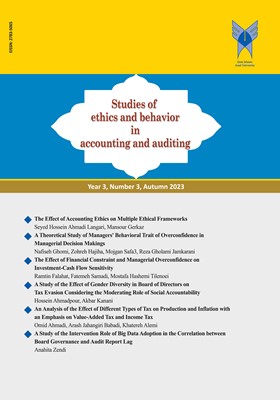The Effect of Financial Constraint and Managerial Overconfidence on Investment-Cash Flow Sensitivity
Subject Areas : Ethics and accounting
Ramtin Falahat
1
![]() ,
Fatemeh Samadi
2
,
Mostafa Hashemi Tilehnouei
3
,
Fatemeh Samadi
2
,
Mostafa Hashemi Tilehnouei
3
![]()
1 - Master's Student, Department of Management, Tehran East Branch, Islamic Azad University, Tehran, Iran.
2 - Assistant Professor, Department of Management, Faculty of Humanities, Tehran East Branch, Islamic Azad University, Tehran, Iran
3 - Assistant Professor, Department of Management, Faculty of Humanities, Tehran East Branch, Islamic Azad University, Tehran, Iran
Keywords: Cash Flow, overinvestment, Managerial overconfidence, Financial Constraint,
Abstract :
Purpose: Access to cash flow is primarily important for the substantiation of corporation investment plans but in various situations, the effect of cash flow on investment may change. Accordingly, the present study has dealt with the impact of financial constraints and managerial overconfidence on investment-cash flow sensitivity. Method: The statistical sample consisted of 153 companies accepted in Tehran Stock Exchange from 2013 to 2021. The required data were collected from audited financial statements in Coda website. 8 hypotheses were proposed in this study and then tested using regression econometrics with fixed effects and Probit regression in EViews.Results: Cash flow has a significantly positive effect on investment and overinvestment. Moreover, financial constraint increases positive investment and overinvestment-cash flow sensitivity although managerial overconfidence has no significant impact on investment and overinvestment sensitivity to cash flow. Yet, when the correlation between financial constraint and managerial overconfidence is considered, positive investment and overinvestment-cash flow sensitivity is reinforced which indicates the important role of financial constraint on adopting investment decisions.Conclusion: By supporting the theory of investment-cash flow sensitivity, findings of the study show that financial constraint, managerial overconfidence, and cash flow all have a vital effect on corporation investment decision making.
Arslan, O., Florackis, C. & Ozkan, A. (2006). The role of cash holdings in reducing investment cash flow sensitivity: Evidence from a financial crisis period in an emerging market. Emerging Markets Review, 7(4), p.320–338.
Arslan-Ayaydin, O., Florackis, C. & Ozkan, A. (2014). Financial flexibility, corporate investment and performance: Evidence from financial crises. Review of Quantitative Finance and Accounting, 42(2), p.211–250.
Ascioglu, A., Hegde, S.P. & McDermott, J.B. (2008). Information asymmetry and investment–cash flow sensitivity. Journal of Banking & Finance, 32(6), p.1036–1048.
Ben-David, I., Graham, J.R. & Harvey, C.R. (2007). Managerial overconfidence and corporate policies. National Bureau of Economic Research.
Bhuiyan, M.B.U. & Hooks, J. (2019). Cash holding and over-investment behavior in firms with problem directors. International Review of Economics & Finance, 61, p.35–51.
Campbell, T., Gallmeyer, M., Johnson, S., Rutherford, J. & Stanley, B. (2011). CEO optimism and forced turnover. Journal of Financial Economics, 101(3), p.695–712.
Chiu, C.J., Ho, A. Y-F. & Tsai, L-F. (2022). Effects of financial constraints and managerial overconfidence on investment-cash flow sensitivity. International Review of Economics and Finance, 82(2022), p.135–155.
Choi, P.M.S., Chung, C.Y. & Liu, C. (2018). Self-attribution of overconfident CEOs and asymmetric investment-cash flow sensitivity. The North American Journal of Economics and Finance, 46, p.1–14.
Deshmukh, S., Goel, A. & Howe, K. (2013). CEO overconfidence and dividend policy. Journal of Financial Intermediation, 22(3), p.440–463.
Fazzari, S., Hubbard, R., Petersen, B., Blinder, A. & Poterba, J. (1988). Financing constraints and corporate investment. Brookings Papers on Economic Activity, No.141.
Goel, A.M. & Thakor, A.V. (2008). Overconfidence, CEO selection, and corporate governance. The Journal of Finance, 63(6), p.2737–2784.
Gul, S. & Tastan, H. (2020). The impact of monetary policy stance, financial conditions, and the
GFC on investment-cash flow sensitivity. International Review of Economics & Finance, 69,
p.692–707.
He, Y., Chen, C. & Hu, Y. (2019). Managerial overconfidence, internal financing, and investment efficiency: Evidence from China. Research in International Business and Finance, 47, p.501–510.
Heaton, J. (2002). Managerial optimism and corporate finance. Financial Management, 31(2),
p.33–45.
Hoshi, T., Kashyap, A. & Scharfstein, D. (1991). Corporate structure, liquidity, and investment: Evidence from Japanese industrial groups. Quarterly Journal of Economics,106(1), p.33–60.
Huang-Meier, W., Lambertides, N. & Steeley, J.M. (2016). Motives for corporate cash holdings: The CEO optimism effect. Review of Quantitative Finance and Accounting, 47(3), p.699–732.
Jensen, M.C. (1986). Agency cost of free cash flow, corporate finance, and takeovers. The American Economic Review, 76(2), p.323–329.
Lewellen, J. & Lewellen, K. (2016). Investment and cash flow: New evidence. Journal of Financial and Quantitative Analysis,51(4), p.1135–1164.
Lin, Y.H., Hu, S.Y. & Chen, M.S. (2005). Managerial optimism and corporate investment: Some empirical evidence from Taiwan. Pacific-Basin Finance Journal,13(5), p.523–546.
Malmendier, U. & Tate, G. (2005). CEO overconfidence and corporate investment. The Journal of Finance, 60(6), p.2661–2700.
Malmendier, U., Tate, G. & Yan, J. (2011). Overconfidence and early-life experiences: The effect of managerial traits on corporate financial policies. The Journal of Finance, 66(5), p.1687–1733.
Mohamed, E.B. & Shehata, M.A. (2017). R&D investment–cash flow sensitivity under managerial optimism. Journal of Behavioral and Experimental Finance, 14, p.1–4.
Mulier, K., Schoors, K. & Merlevede, B. (2016). Investment-cash flow sensitivity and financial constraints: Evidence from unquoted European SMEs. Journal of Banking & Finance, 73,
p.182–197.
Myers, S.C. & Majluf, N.S. (1984). Corporate financing and investment decisions when firms have information that investors do not have (No. w1396). National Bureau of Economic Research.
Richardson, S. (2006). Over-investment of free cash flow. Review of Accounting Studies, 11(2-3), p.159–189.
Yung, K., Li, D.D. & Jian, Y. (2015). The value of corporate financial flexibility in emerging countries. Journal of Multinational Financial Management, 32, p.25–41.
_||_


